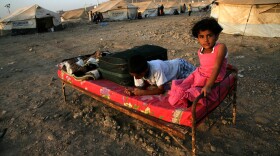Arkansas's all-Republican US House delegation voted for the nation to temporarily stop taking in Syrian and Iraqi refugees while expanding the vetting process. Central Arkansas Congressman French Hill talked about his vote with KUAR.
KAUFFMAN: The House just voted to stop taking in Syrian and Iraqi refugees, temporarily, in the aftermath of terrorist attacks in Paris. The bill passed today, the SAFE Act, calls for the US to temporarily stop taking in refugees, less than 200 were admitted last month (President Obama is calling for 10,000), and charges federal agencies with improving the vetting process. So, how do they do that? What do you envision the process to be?
HILL: It takes the existing vetting process that the Department of State and Homeland Security through the Border Patrol do now. It puts on top of it a certification process where the director of the FBI, the Department of State, the director of National Intelligence all certify that these refugees have passed the background test and that they don’t present a national security risk to the U.S.
It doesn’t really change the existing vetting process, it puts on top of it this additional certification step by the leaders of the intelligence community.
KAUFFMAN: Do you think it's feasible to ask each director to individually assess each of these people? The process on average already takes over a year.
HILL: The state Department and border security agents do that now on an individual, customized basis. They do personal interviews, they do biometric screenings and so they would get that information from the Department of State and review it, verify it and certify it.
In my view I don’t think it will add a meaningful amount of time to the vetting process that we have now. But it does give people more comfort that the top echelons of our national security apparatus have in mind that any potential of a national security threat from someone who comes seeking asylum would have that extra stamp of approval.
KAUFFMAN: A prod in the way of accountability for the heads of those agencies as well? You don’t want to have your name next to…
HILL: That’s right. We’ve done that in government before. I can think back to the Sarbanes-Oxley Act where corporate CEOs and corporate CFOs were asked to personally certify the financial statements of the company. That is exactly an exercise in the ultimate accountability of those in charge.
KAUFFMAN: Your response to the attacks in Paris, like most of your colleagues and a number of Democrats, has been to stop taking refugees. France on the other hand, the target of the attack, has opted to continue taking 30,000 refugees over the next two years. France’s president called it a “humanitarian duty.”
HILL: Well, of course America’s still taking refugees. What we’re doing is we’re ascertaining at a very heightened screening and vetting level that those refugees pose no risk to the US. This is based on the fact that in the past we’ve had breaches. We’ve had two Iraqi refugees that were seeking asylum in the United States that were leaders in a terrorist plot in the US shortly after their admission.
The national security debate that we’ve had this week has been lead by the Department of Homeland Security and FBI Director [James] Comey. They’ve made this recommendation to the best of their ability. I think each country needs to do what I think is in their best interest.
KAUFFMAN: The conversation over refugees and just generally about preventing terrorism has fed as it sometimes does into really visceral anti-Islam rhetoric. There are Republican US House members as well as a state senator in your district calling for religious tests on immigration, banning Muslims, and condemning the religion wholesale. Do you stand with that sentiment or do you generally welcome people who might be Muslim in your own neighborhood?
HILL: America has a tradition of welcoming people from all faiths. Our country was founded on freedom of religion. That was one of the great attractions to colonial America, the ability to express one’s religion freely and it’s enshrined in our Constitution.
I don’t believe that we should have a test per se of religious feeling one way or the other. What I think is important is that we vet carefully anyone seeking asylum in the US to make sure that they don’t pose a national security risk.
Secondly, I think we need to do additional things that people coming here on a visa with a legitimate passport are screened carefully using technology and data management systems we have. We’re just as at risk with someone coming to the United States with an existing passport with applicability to the US. I think we should be equally cautious there as well.
KAUFFMAN: If this new vetting process comes into place, it’s something you find satisfactory, you think the process is working, is there a number of refugees you think the United States need to take?
HILL: No. I think the US needs to work with our allied nations and the United Nations on thinking through what the best refugee program is.
I’ll tell you though, it would be good if we could have had leadership from the Obama administration and gotten a more quick solution over the past three years to the tragic trauma in Syria that’s produced 50 percent of the nation leaving.
Secondly, we need to work with our allies on providing humanitarian assistance. Frankly as close to their country as they can so that they can hopefully return to a more peaceful homeland in the future. We need a strategy.




